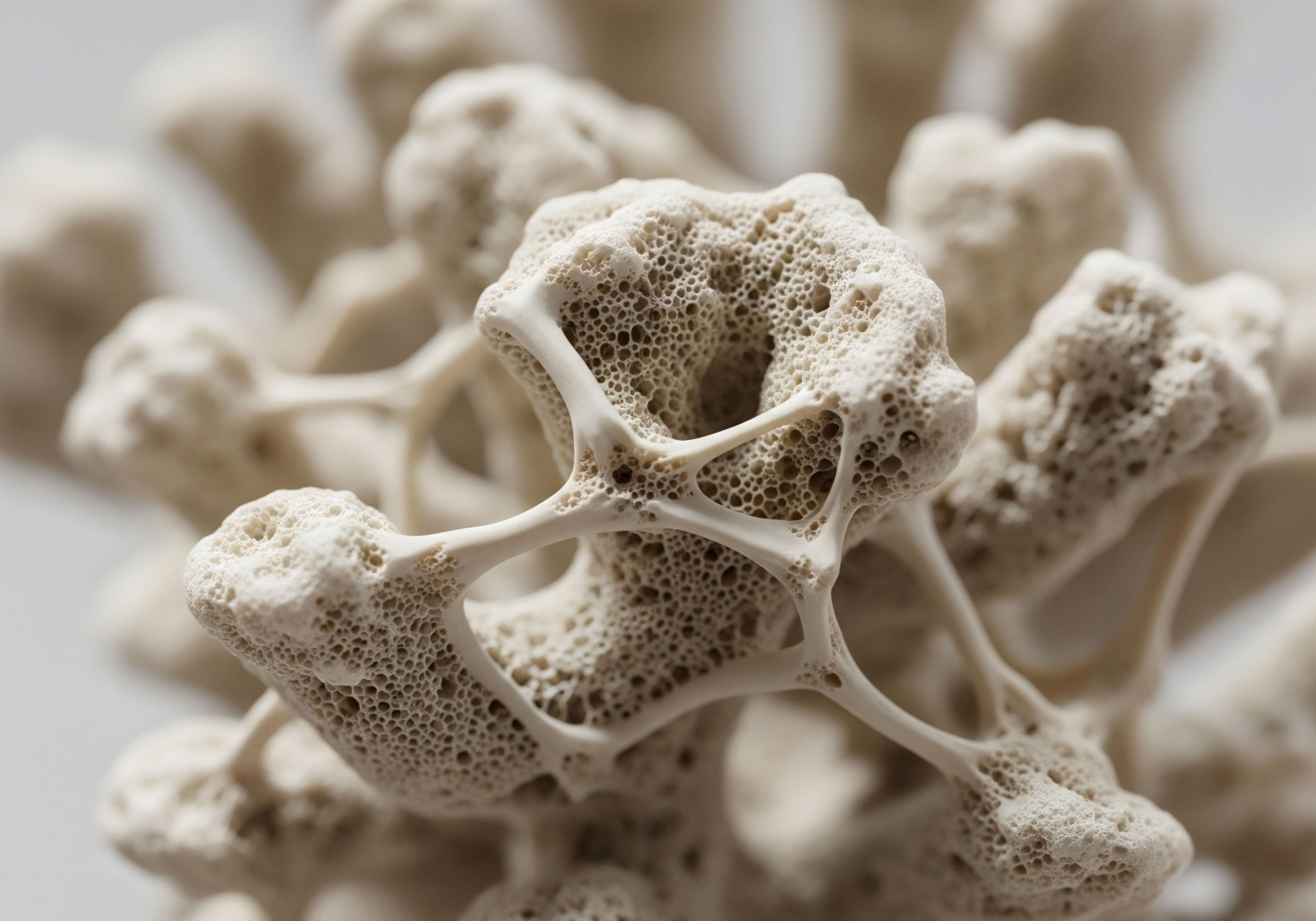

Fundamentals
The experience of searching for a word that was just on the tip of your tongue, or the subtle yet persistent feeling that your mental sharpness has begun to dim, is a deeply personal and often unsettling aspect of aging. Many people attribute these moments to the inevitable passage of time.
The biological reality is often more specific and, importantly, more addressable. Your cognitive function is intimately connected to the complex and dynamic world of your endocrine system. The hormones that govern your energy, mood, and physical vitality are the very same chemical messengers that support and sustain the intricate workings of your brain.
As the body ages, the production of key hormones naturally declines. For men, this manifests as a gradual reduction in testosterone, a process often termed andropause. For women, the transition through perimenopause and into menopause is marked by a more rapid decrease in estrogen and progesterone.
These are not isolated events confined to reproductive health; they represent a systemic shift that has profound implications for neural processing. Sex hormones have fundamental roles in cognitive and neural health. Estrogen, for instance, is a powerful agent in the brain, helping to regulate neurotransmitters, the chemical signals that form the basis of memory and thought.
When its levels fluctuate and fall, the stability of this signaling can be disrupted, leading to the frustrating “brain fog” and memory lapses that many women report.
The decline in sex hormones like estrogen and testosterone is a primary driver behind age-related changes in brain function and cognitive clarity.
Similarly, testosterone does more than build muscle and bone; it is a key modulator of brain health in both men and women. It contributes to cerebral blood flow, ensuring that brain cells receive the oxygen and nutrients they need to function optimally.
A decline in testosterone can therefore contribute to a perceptible slowing of cognitive processing speed and a reduction in mental stamina. Understanding this connection is the first step toward reclaiming your cognitive vitality. The changes you may be experiencing are not a personal failing; they are a physiological process.
This understanding allows for a shift in perspective, moving from passive acceptance to proactive engagement with your own biology. It opens the door to a dialogue about how restoring hormonal balance can directly support the health and resilience of your brain.

The Brain’s Hormonal Environment
Your brain is a remarkably sensitive organ, exquisitely tuned to its chemical environment. Hormones act as conductors of this internal orchestra, ensuring that different regions of the brain communicate effectively. They influence everything from the birth of new neurons (neurogenesis) to the strength of connections between existing ones (synaptic plasticity). When hormonal levels are optimal, this system functions seamlessly. When they decline, the communication network can become less efficient.
Consider the hippocampus, a region of the brain that is central to learning and memory. This area is rich in receptors for both estrogen and testosterone. These hormones actively promote the health of hippocampal neurons and enhance their ability to form and retrieve memories.
Studies have shown that declining estrogen levels during menopause are linked to changes in this very region, offering a direct biological explanation for the cognitive shifts many women experience. Likewise, maintaining adequate testosterone levels is associated with better performance on tasks related to verbal and visual memory. The conversation about age-related cognitive decline, therefore, becomes a conversation about maintaining the optimal chemical environment for your brain to flourish.


Intermediate
Understanding that hormonal decline impacts cognition leads to a critical question ∞ What can be done about it? The clinical answer lies in carefully managed hormonal optimization protocols designed to restore the body’s biochemical balance. These interventions are built upon a deep understanding of the endocrine system’s feedback loops, aiming to replenish deficient hormones to levels associated with youthful vitality and function.
This process involves precise, individualized therapies that go far beyond a one-size-fits-all approach, utilizing bioidentical hormones and targeted peptides to support the body’s own signaling pathways.
The goal of these protocols is to re-establish the physiological environment in which the brain and body were designed to operate. This involves a sophisticated clinical strategy, beginning with comprehensive lab work to create a detailed map of an individual’s unique hormonal landscape. Blood panels assess levels of key hormones like testosterone, estradiol (a form of estrogen), and progesterone, as well as the pituitary hormones that regulate their production. This data provides the blueprint for a personalized therapeutic plan.

Protocols for Male and Female Hormonal Recalibration
While the goal of hormonal balance is universal, the clinical application differs significantly between men and women, reflecting their distinct physiological needs. These protocols are designed to address the specific symptoms and long-term health considerations associated with andropause and menopause.

Testosterone Replacement Therapy for Men
For middle-aged and older men experiencing the fatigue, low libido, and cognitive fog associated with low testosterone (hypogonadism), Testosterone Replacement Therapy (TRT) is a foundational protocol. The standard of care often involves weekly intramuscular injections of Testosterone Cypionate. This bioidentical hormone is chemically identical to the testosterone produced by the body, ensuring it interacts correctly with receptors throughout the brain and body.
A comprehensive male protocol includes supporting medications to ensure the system remains in balance. Anastrozole, an aromatase inhibitor, is frequently prescribed to prevent the conversion of excess testosterone into estrogen, mitigating potential side effects. To maintain the body’s own hormonal signaling, Gonadorelin is used.
This peptide stimulates the pituitary gland to produce Luteinizing Hormone (LH) and Follicle-Stimulating Hormone (FSH), which in turn signals the testes to continue their natural function. This preserves testicular size and fertility, creating a more holistic and sustainable physiological state.
Comprehensive TRT protocols for men integrate testosterone with supporting medications like Anastrozole and Gonadorelin to maintain systemic endocrine balance.

Hormonal Optimization for Women
For women navigating the complex hormonal fluctuations of perimenopause and post-menopause, therapy is more nuanced, often involving a delicate balance of multiple hormones. Low-dose Testosterone Cypionate, administered via subcutaneous injection, can be highly effective for restoring energy, libido, and cognitive clarity. The dosage is significantly lower than that used for men, tailored to restore female testosterone levels to the optimal range of their younger years.
Progesterone is another vital component of female hormonal health. Its decline during menopause is linked to sleep disturbances and anxiety, both of which impact cognitive function. Supplementing with bioidentical progesterone can restore calming neural pathways and improve sleep quality, which is essential for memory consolidation.
In some cases, pellet therapy, which involves implanting long-acting pellets of testosterone, may be used for sustained, steady-state hormone delivery. As with men, Anastrozole may be included if there is a concern about the conversion of testosterone to estrogen.

The Role of Growth Hormone Peptides
Beyond sex hormones, other signaling molecules play a crucial part in cognitive health and anti-aging. Growth Hormone (GH) is a key regulator of cellular repair and metabolism. Its production declines with age, contributing to slower recovery, changes in body composition, and diminished vitality. Direct replacement of GH can be complex, so clinical practice has evolved to use specific peptides that stimulate the body’s own GH production.
These Growth Hormone Releasing Peptides (GHRPs) and Growth Hormone Releasing Hormones (GHRHs) offer a more physiological approach. A common and effective combination is Ipamorelin and CJC-1295. Ipamorelin provides a clean, potent pulse of GH release from the pituitary gland, while CJC-1295 extends the duration of that release.
This synergy amplifies the body’s natural GH production rhythms, particularly during sleep, which is the primary time for cellular repair and memory consolidation. Patients on this protocol often report significant improvements in sleep quality, recovery from exercise, and a sharpening of mental focus.
| Therapeutic Agent | Primary Function | Target Audience | Common Administration |
|---|---|---|---|
| Testosterone Cypionate | Restores testosterone levels | Men with hypogonadism; Women with low testosterone | Intramuscular or Subcutaneous Injection |
| Anastrozole | Blocks estrogen conversion | Men on TRT; Women on specific protocols | Oral Tablet |
| Gonadorelin | Stimulates natural testosterone production | Men on TRT or seeking fertility support | Subcutaneous Injection |
| Progesterone | Supports sleep, mood, and hormonal balance | Peri- and Post-menopausal Women | Oral Capsule or Topical Cream |
| Ipamorelin / CJC-1295 | Stimulates natural Growth Hormone release | Adults seeking anti-aging and cognitive support | Subcutaneous Injection |


Academic
A sophisticated examination of hormonal recalibration and its effect on age-related cognitive decline requires a deep analysis of the molecular and systemic interplay between sex steroids and neural architecture. The brain is a primary target organ for hormones like 17β-estradiol and testosterone.
Their influence extends far beyond simple activation; they are potent modulators of neuronal structure, function, and resilience. The cognitive benefits observed in some hormone therapy studies are rooted in these complex biological mechanisms, particularly within brain regions critical for memory and executive function, such as the hippocampus and prefrontal cortex.
Estrogen, in particular, has been shown to exert significant neuroprotective effects through a variety of genomic and non-genomic pathways. Genomically, it binds to estrogen receptors (ERα and ERβ) within neurons, which then act as transcription factors to regulate the expression of genes involved in cell survival, synaptic plasticity, and antioxidant defense.
For example, estrogen upregulates the production of Brain-Derived Neurotrophic Factor (BDNF), a key protein that supports the growth and differentiation of new neurons and synapses. This mechanism provides a direct link between the presence of estrogen and the brain’s capacity for learning and adaptation.

How Does the Hypothalamic-Pituitary-Gonadal Axis Affect Brain Aging?
The entire system of sex hormone production is governed by the Hypothalamic-Pituitary-Gonadal (HPG) axis, a complex feedback loop that begins in the brain. The hypothalamus releases Gonadotropin-Releasing Hormone (GnRH), which signals the pituitary to release Luteinizing Hormone (LH) and Follicle-Stimulating Hormone (FSH).
These hormones, in turn, travel to the gonads (testes in men, ovaries in women) to stimulate the production of testosterone and estrogen. With age, the sensitivity of this axis changes, leading to the decline in sex hormone output that characterizes andropause and menopause.
This age-related dysregulation of the HPG axis has direct consequences for the brain. The decline in negative feedback from the gonads can lead to elevated levels of LH, which some research suggests may have a pro-inflammatory effect on the brain, potentially contributing to the pathology of neurodegenerative diseases like Alzheimer’s.
Clinical protocols that use agents like Gonadorelin or Clomid are, in essence, intervening directly in this axis to modulate its function in a more youthful and balanced manner. By restoring a more physiological pattern of hormonal signaling, these therapies may help to mitigate the downstream effects of HPG axis aging on the central nervous system.
Modulating the Hypothalamic-Pituitary-Gonadal (HPG) axis through targeted therapies represents a sophisticated strategy to counteract the neurobiological consequences of hormonal aging.

Clinical Evidence and the Timing Hypothesis
The clinical data on hormone replacement therapy (HRT) and cognition has been mixed, leading to the development of the “critical window” or “timing hypothesis.” This hypothesis posits that the neuroprotective benefits of hormone therapy are most pronounced when initiated close to the onset of menopause.
The Women’s Health Initiative Memory Study (WHIMS), a large-scale clinical trial, reported an increased risk of dementia in women who initiated combined estrogen-progestin therapy many years after menopause. This finding initially cast a shadow over the use of HRT.
Subsequent analyses and observational studies, however, have painted a more detailed picture. Research suggests that when estrogen therapy is started during the perimenopausal period, it may help preserve cognitive function and even reduce the risk of developing Alzheimer’s disease later in life. The theory is that estrogen helps maintain a healthy neuronal environment.
Once significant neurodegeneration has occurred, introducing hormones may not be able to reverse the damage and could potentially have negative effects. This underscores the importance of proactive, early intervention based on individual symptoms and biomarker analysis. The debate highlights the complexity of hormonal interventions and reinforces that timing, dosage, and formulation are all critical variables in achieving positive cognitive outcomes.
- Neurotransmitter Modulation ∞ Estrogen influences the synthesis and activity of key neurotransmitters, including acetylcholine, serotonin, and dopamine, all of which are vital for memory, mood, and attention. A decline in estrogen disrupts this delicate balance.
- Cerebral Blood Flow ∞ Both estrogen and testosterone help maintain healthy blood vessels and promote adequate blood flow to the brain, ensuring neurons receive the oxygen and glucose necessary for high-level cognitive processing.
- Anti-Inflammatory Effects ∞ Chronic inflammation is a known contributor to neurodegeneration. Estrogen has been shown to have anti-inflammatory properties within the brain, helping to protect neurons from inflammatory damage.
- Amyloid-Beta Regulation ∞ Some research suggests that estrogen may play a role in modulating the production and clearance of amyloid-beta protein, the primary component of the plaques found in the brains of individuals with Alzheimer’s disease.
The scientific inquiry into hormonal recalibration for cognitive health continues to evolve. Current research is focused on understanding the differential effects of various estrogen and progestin formulations, the role of androgens in female cognition, and the potential for selective estrogen receptor modulators (SERMs) to provide cognitive benefits without the systemic risks. The evidence points toward a future where personalized endocrine therapies, initiated at the optimal biological time, become a cornerstone of strategies to preserve cognitive function throughout the lifespan.
| Hormone/Peptide | Mechanism of Cognitive Action | Relevant Brain Region | Supporting Evidence |
|---|---|---|---|
| Estrogen (17β-estradiol) | Upregulates BDNF, modulates neurotransmitters, anti-inflammatory | Hippocampus, Prefrontal Cortex | Observational studies and the “timing hypothesis” |
| Testosterone | Improves cerebral blood flow, supports dopamine function | General Cortex, Hippocampus | Studies linking higher levels to better verbal/visual memory |
| Progesterone | Promotes GABAergic (calming) pathways, improves sleep quality | Reticular Activating System | Clinical observation of improved sleep and reduced anxiety |
| Growth Hormone (via Peptides) | Improves sleep quality (memory consolidation), cellular repair | Pituitary Gland, Systemic | Patient reports of improved mental clarity and focus |

References
- Resnick, S. M. & Henderson, V. W. (2002). Hormone therapy and risk of developing dementia. JAMA, 288(17), 2170 ∞ 2172.
- Maki, P. M. & Henderson, V. W. (2012). Hormone therapy, dementia, and cognition ∞ the Women’s Health Initiative Memory Study. The Lancet Neurology, 11(10), 907-917.
- Sherwin, B. B. (2003). Estrogen and cognitive functioning in women. Endocrine Reviews, 24(2), 133-151.
- Brann, D. W. Dhandapani, K. Wakade, C. Mahesh, V. B. & Khan, M. M. (2007). Neurotrophic and neuroprotective actions of estrogen ∞ basic mechanisms and clinical implications. Steroids, 72(5), 381-405.
- Henderson, V. W. (2014). Alzheimer’s disease ∞ review of hormone therapy trials and implications for prevention and treatment. The Journal of Steroid Biochemistry and Molecular Biology, 142, 99-106.
- Hogervorst, E. Yaffe, K. Richards, M. & Huppert, F. (2002). Hormone replacement therapy for cognitive function in postmenopausal women. Cochrane Database of Systematic Reviews, (3).
- Beauchet, O. (2006). Testosterone and cognitive function ∞ a systematic review. Cerebrovascular Diseases, 22(5-6), 346-352.
- Pike, C. J. Carroll, J. C. Rosario, E. R. & Barron, A. M. (2009). Protective actions of sex steroid hormones in Alzheimer’s disease. Frontiers in Neuroendocrinology, 30(2), 239-258.

Reflection
The information presented here offers a map of the intricate biological landscape that connects your hormonal health to your cognitive vitality. It is a map drawn from decades of clinical research and a deep understanding of human physiology. This knowledge provides a powerful framework for understanding the changes you may be experiencing.
It moves the conversation from one of passive aging to one of active, informed biological management. Your personal health story is unique, written in the language of your own biochemistry and lived experience. The path toward restoring your cognitive function and reclaiming your vitality begins with this understanding. It is a journey of self-knowledge, empowered by science, that puts you back in the driver’s seat of your own well-being.



